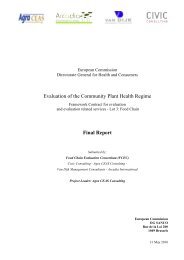2294 part 1 final report.pdf - Agra CEAS Consulting
2294 part 1 final report.pdf - Agra CEAS Consulting
2294 part 1 final report.pdf - Agra CEAS Consulting
You also want an ePaper? Increase the reach of your titles
YUMPU automatically turns print PDFs into web optimized ePapers that Google loves.
Prevention and control of animal diseases worldwide<br />
Part I: Economic analysis: prevention versus outbreak costs<br />
5.1.4. Comparison of prevention versus outbreak costs<br />
A review of the cost-benefit of improvements in Argentina’s and other Latin American veterinarian<br />
systems was recently undertaken by the OIE Regional Representation/CEMA (A141) 105 . The review<br />
indicates that the cost of provision of veterinary services in Latin America is approximately US $ 300<br />
million per year. This means each dollar spent on veterinary services covers a stock value of between US<br />
$280-300 per animal, in other words expenditure per year on official veterinary services equates to 0.3%<br />
of the value of the stock. Starting from the current situation as a baseline, the potential economic benefits<br />
from reduced animal disease incidence resulting from different scenarios of increased investment in<br />
veterinary services are explored. The current situation is described in terms of expenditure per animal<br />
equivalent, which ranges from US $ 1.5 in Argentina to US $ 0.4 – 0.50 in Paraguay and Peru and US $<br />
0.7 in Brazil. One scenario envisages an increase in the expenditure of US$ 0.32/animal equivalent. This<br />
would result in increased expenditure of US$ 18 million in Argentina.<br />
Preliminary results, in the case of Argentina, indicate that productivity increases from a reduction in<br />
animal disease incidence would range from 5% to 15%, which (taking a value of US$ 0.8 per animal<br />
equivalent and attributing this to the increase in meat output) could generate revenue in Argentina of US$<br />
20 million. In terms of the potential trade impact, assuming a 20% price improvement (earlier research<br />
suggests that there could be up to 40% increase in Argentinean prices resulting from removal of FMD),<br />
Argentina could gain an additional 260,000 tonnes of exports. It is noted that the region as a whole could<br />
achieve total exports of 1.9 million tonnes (compared to present exports from these countries of 1.2<br />
million tonnes) i.e. 60 % increase. It is concluded that the <strong>final</strong> outcome in terms of NPV and welfare<br />
gains justifies the investment.<br />
Trade benefits in return to this type of investment are also expected by other experts, including the WB. It<br />
is noted that Uruguay, a country that has followed a very similar path to Argentina in improving animal<br />
health conditions during the 1990s and was declared "FMD-free without vaccination" by the OIE in May<br />
1996, was able to gradually open up selective export markets in Europe, Asia, and North America,<br />
reaching a total of US$412 million in 2000 (A230).<br />
In addition, there are poverty alleviation arguments in support of such investment. In its latest <strong>report</strong> on<br />
Argentina’s agricultural sector, the WB recommends investing inter alia in SPS systems, as an effective<br />
way to help improving poverty conditions (A260).<br />
More generally, the WB notes that Argentina’s experience with FMD control demonstrates how a program<br />
based on a regionally concerted effort and strongly supported over a number of years with adequate legal,<br />
technical and financial means finds success, but reversal is still possible if support weakens. The same<br />
conclusion can be drawn also from the experience of other countries in the region such as Uruguay (A230)<br />
and Brazil (A175).<br />
Our analysis in this section leads us to the following conclusions:<br />
105 This research is currently in progress – results are preliminary. Further findings are presented in Table 10.<br />
Civic <strong>Consulting</strong> • <strong>Agra</strong> <strong>CEAS</strong> <strong>Consulting</strong> 102













